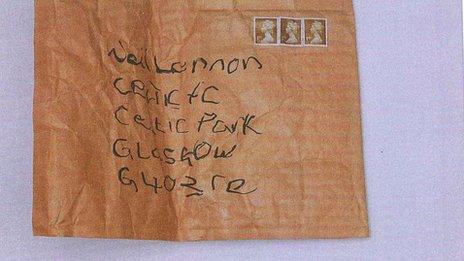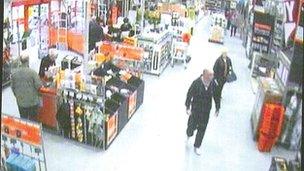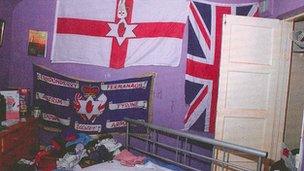How police cracked Neil Lennon bomb plot
- Published

Five packages were sent in total, with four being intercepted before delivery
Exactly a year ago Strathclyde Police were in the middle of a major manhunt, trying to track down the men behind a parcel bomb plot which appeared to be threatening death or injury.
It was a time of heightened sectarian tension following a particularly ill-tempered Old Firm football match between Rangers and Celtic.
The cup tie had ended with a confrontation between the Celtic manager Neil Lennon and Ally McCoist of Rangers - images which were beamed around the world.
Within hours of the match, the first of five parcels had been dispatched, addressed to Mr Lennon at Celtic Park in the east end of Glasgow.
Another package to the former Northern Ireland international would follow, this time addressed to the club's training ground at Lennoxtown, East Dunbartonshire.

McKenzie was recorded on CCTV shopping for components at a DIY store
It was followed by three more: to the retiring Labour politician, Trish Godman, who had worn a Celtic top on her last day in the Scottish Parliament; the offices of Cairdè Na H'Eireann, an Irish republican group in Glasgow; and the late Paul McBride QC, an advocate who had acted for Mr Lennon and Celtic.
Police enlisted the support of shadowy agencies and covert operatives, but it was old-fashioned policework which cracked the case and led to the would-be bombers.
Two detectives carrying out door-to-door inquiries noticed that the B&M store at the Hawkshill Retail Park in Stevenston, Ayrshire, stocked items similar to those used to make up the suspect packages: padded A5 envelopes, 100ml plastic travel bottles and distinctive cheap sports watches.
The other main component was nails - and two doors down was B&Q.
Using receipts and CCTV, police identified Neil McKenzie shopping with his mother, buying the items for just a few pounds.
McKenzie, 42, is an unemployed builder from Saltcoats, his accomplice Trevor Muirhead, 44, is a van driver from Kilwinning, both Ayrshire.
Both men were steeped in loyalism. They were Rangers supporters with a hatred for Celtic, Irish Republicanism and, in particular, the man they felt embodied both: Neil Lennon.
Having identified the suspects, police planted a bug in McKenzie's car and started following both men.
The conversations they recorded were crucial in proving that Muirhead and McKenzie were involved in the plot.
The plotters were heard discussing two litres of peroxide which they had sourced from Muirhead's hairdresser son. They had later apparently mixed the peroxide in an attempt to make the potentially explosive substance Triacetone Triperoxide, which was found in the "bombs".
The conversation ran: "Did you bin all the..." "Aye, I put it all in the bin. Dinnae worry about it." "And there's nothing left anywhere else? Everything is in the bin, right? Cannae turn around and say we've got peroxide or anything like that."
They were heard chatting about "planting" something outside a police station and letting it off.
McKenzie added that police thought they were dealing with "a couple of hillbillies".
Muirhead replied: "They think all the Ayrshire boys are dafties."
Police then raided McKenzie's home in Links Road, Saltcoats, and Muirhead's property in Innerwood Road, Kilwinning.
Officers seized a number of items from the houses, including mobile phones.
A message from Muirhead to McKenzie on 16 April was discovered.
It read: "Sorry about the time m8. Our package was in Pennyburn last night waiting on navy bomb disposal."
Another text said: "Not heard anything about it must be on its way m8."
Muirhead had a phone conversation with his son Gordon after reports of the bomb plot appeared on TV.

Both men were steeped in Loyalism and anti-Celtic sentiment
He referred to "more than one" being posted and when asked had he sent them, Muirhead told his son: "Never you mind".
Muirhead was later quizzed by detectives and pinned the blame on McKenzie for the first package sent to Lennon.
He said the incidents must have been sparked off by a "hatred" of the Northern Irishman.
Muirhead said he was "terrified" of his friend, adding that he could be "really quite violent".
The jury heard the interview in which he claims to have once been an "avid follower" of Celtic - despite being a former member of the Orange Order and the Apprentice Boys of Derry.
His home was also plastered with Rangers and Loyalist material.
McKenzie told officers he got bomb making tips from watching the A-Team, and he had seen on the internet how to use peroxide to make a flash.
He admitted knowing about the first device sent to Lennon and confessed to buying parts for other packages, adding: "I told folk how to make them."
McKenzie went on to state he was a Rangers and Barcelona supporter - but took his young son to junior football to get away from the Old Firm hatred.
Prosecutor Tim Niven Smith said in his closing speech that the Crown case was based on the belief both accused thought the packages were harmful.
In the end, the devices were not judged to be viable: they could not have exploded. But police say if Muirhead and McKenzie hadn't been stopped, they could eventually have killed.
- Published30 March 2012